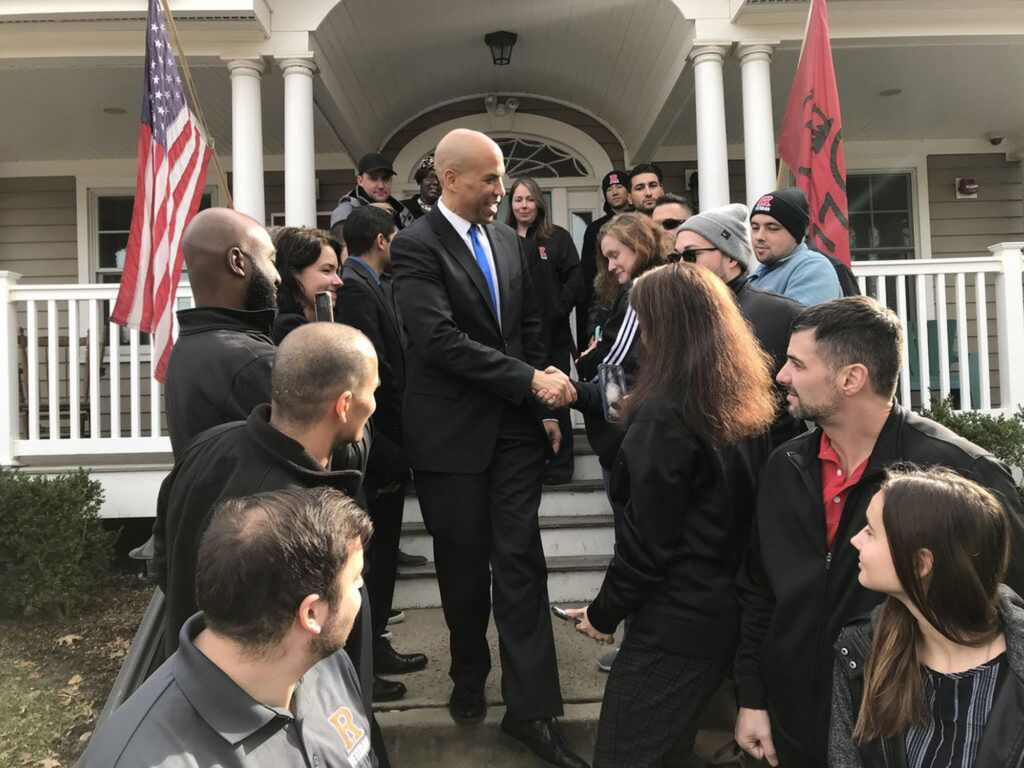Written By Candace McDuffie
April 1, Sen. Cory Booker (D-N.J.) made history by having the longest Senate speech in history by holding the upper chamber’s floor for over 25 hours. This was no April Fool’s Day prank. As he poignantly criticized President Donald Trump’s second White House term and the Republican Party’s tentative spending cuts, Booker beat out segregationist and former South Carolina Sen. Strom Thurmond’s record when he spoke for 24 hours and 18 minutes in an effort to block the Civil Rights Act back in 1957.
“These are not normal times in our nation,” he said as he began his speech Monday night. “And they should not be treated as such in the United States Senate. The threats to the American people and American democracy are grave and urgent, and we all must do more to stand against them.”
Booker’s marathon speech was highlighted by the fact that he didn’t drink water or eat food throughout its entirety. The 55-year-old politician credited his athletic past as a former high school football player as the reason for his resilience. He also stated that prayer and faith played a role in pulling off his viral stunt.
“I just really lean on faith that we can get through this and I’m just so grateful for my colleagues who really covered me in prayer,” Booker told reporters according to The Hill. Besides galvanizing the left with a fervent anti-Trump speech, his career has been an impressive one steeped in authenticity, resolve, and advocacy for people.

Booker’s Modest Beginnings
Booker was born in Washington, D.C. before moving to northern New Jersey when he was a young boy. He has regularly spoken about the racism he experienced, growing up in a predominantly white neighborhood. His parents, Cary Alfred and Carolyn Rose Booker, were not just civil rights activists — they were also two of the first Black executives at IBM. He attended Stanford University and received a bachelor’s degree in political science as well as a master’s degree in sociology.
When Booker wasn’t playing varsity football, he also was in charge of a student-run crisis hotline. He went on to attend Yale Law School and operated free legal clinics for low-income residents in Connecticut. He was involved in the National Black Law Students Association and the Big Brothers Big Sisters organization. Booker obtained his juris doctor in 1997.
A Bright Political Future
Booker began his political career at 29 years of age. He returned to New Jersey after finishing his education and took an interest in local politics. In 1998, he defeated four-term Newark City Council incumbent George Branch. To draw attention to the city’s drug and crime problems, Booker went on a 10-day hunger strike and resided in a tent close to drug-dealing areas.
He later ran for the mayoral seat against Sharpe James, who questioned Booker’s Blackness during his campaign. Booker lost the election and finished his council term in 2002. However, he devoted his time to starting nonprofit organizations that equipped Newark residents with community resources and services. The Democrat would run again for mayor in 2006 — and win.
Powerful Two-Term Mayoral Tenure
When Booker became Newark mayor, he was the third consecutive Black person to govern the city since 1970. The politician zeroed in on city reform, which included an overhaul of the police department and Newark’s structural financial deficit. Booker patrolled city streets to bring down crime, shovelled out driveways for elderly residents and worked tirelessly on gun control measures.
In 2012, he saved a woman from a house fire and wound up suffering second-degree burns on his hands as well as smoke inhalation. Not only did the Toronto Sun dub Booker “super-mayor,” but he appeared on The Oprah Winfrey Show, received a $100 million donation from Mark Zuckerberg for the city’s education fund and gave a speech at the Democratic National Convention.
When a special election was held to fill Frank Lautenberg’s Senate seat after his death, Booker easily won the race.
New Jersey’s First Black Senator
When Booker was sworn into the Senate in 2013, he became the first Black person elected since former President Barack Obama in 2004. He also became New Jersey’s first Black senator. One year later, he was re-elected for a full six-year term. During this stint, he was a vocal proponent of same-sex marriage, an increase in the federal minimum wage, and higher taxes for the wealthy.
Booker also co-sponsored legislation that worked to reform the criminal justice system, and the bill was ultimately signed into law in 2018. He also introduced a bill to study the impact of slavery on generations of Black people and possible reparations for descendants of slaves.
Booker’s Ambitious 2020 Presidential Bid
On Feb. 1, 2019, the first day of Black History Month, Booker made an email announcement to his supporters that he was running for president in 2020.
“The history of our nation is defined by collective action; by interwoven destinies of slaves and abolitionists; of those born here and those who chose America as home; of those who took up arms to defend our country, and those who lined arms to challenge and change it,” he explained in a video.
Even though he was a notable public figure, Booker could not garner the momentum he needed as the campaign season advanced. Instead, polls displayed promise for his Democratic competitors including former President Joe Biden. Booker later failed to qualify for the sixth Democratic debate. In 2020, he revealed that he was suspending his presidential campaign.
RELATED CONTENT: Senator Cory Booker’s 25-Hour Marathon Speech Is One For Record Books


